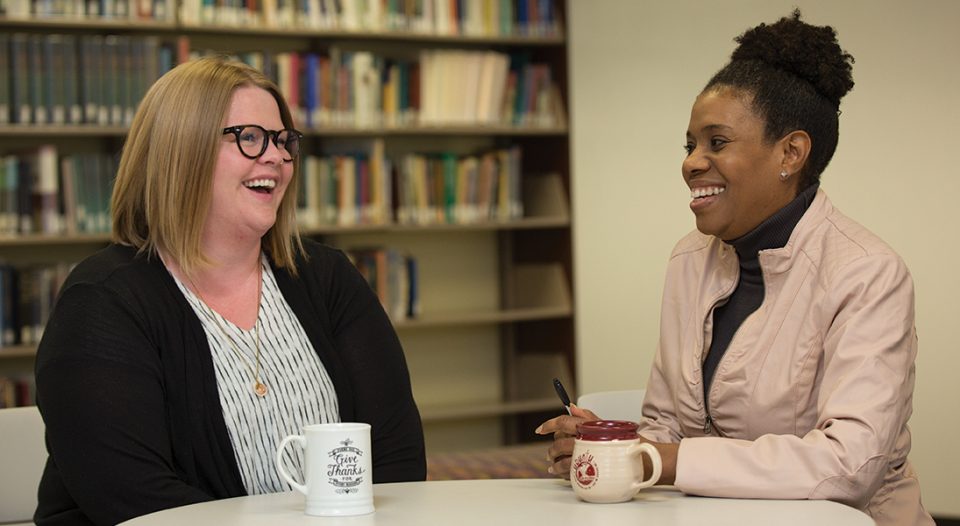The term “intersectionality” has been in use for about 30 years, but not everyone is familiar with its meaning. Generally, it refers to the ways in which different forms of discrimination—related to ethnicity, gender, sex, sexuality and class, among other identifying factors—intersect for those who are most marginalized in society.
As members of a denomination called to serve those of all identities, it seems more vital than ever in today’s divided culture that the ELCA approach ministry in a way that recognizes the intersection of oppressions in church and life.
Living Lutheran spoke with Judith Roberts, ELCA program director for racial justice ministries, and Aubrey Thonvold, executive director of ReconcilingWorks, about their thoughts on intersectionality, allies and how their work overlaps.
Living Lutheran: Could you each say a bit about your work and ministry?
Roberts: My role is responsible for the ministry of focusing on racism and thinking about how that impacts us institutionally, and how we show up as church in society around justice issues. It’s not limited to only talking about race and racism, although that is one of the priorities of our denomination through our “Freed in Christ” social statement. This work happens through this desk in accompaniment with our congregations, our synods, our social service agencies, our seminaries, and our colleges and universities, as well as with our ecumenical partners.
Thonvold: ReconcilingWorks was founded in 1974, and it’s our mission to accompany the Lutheran church in the welcome, inclusion and advocacy of LGBTQ people. We live that out in all three expressions of the church—in congregations, in synods and at the churchwide level. And we do this work primarily through our flagship Reconciling in Christ (RIC) program, founded in 1983.
Since then, we’ve been working to create spaces that have publicly named and made a welcome statement to make sure that LGBTQ people have a safe place to worship. RIC communities’ welcome statements never just say, “We welcome LGBTQ people, period.” RIC communities work to be more intentional, often including race, economic status, ability, age, gender, addiction and so on.
What does intersectionality mean to you?
Roberts: The terminology of intersectionality came from the work of Kimberlé Crenshaw, who at the time [of coining the term] was an attorney and a woman of color. Through her legal work, she understood that there were voices and experiences that were falling through the cracks when it came to talking about forms of discrimination and harassment. As a woman of color, that language helped me understand the multiple ways that my identity shaped my experience in the places that I felt oppression, and also the ways, on the flip side of that coin, where I know I have certain levels of privilege based on the different identities that I carry.
Thonvold: At ReconcilingWorks, we know LGBTQ people come in all bodies, so in order for us to be doing deep, rich, authentic LGBTQ work, our work must be intersectional.
“Let’s be the church who does this well. I want to be part of a church that is known for how well we walk with humility and strive for justice.”
How do you feel about the term “ally”?
Thonvold: I’m deeply grateful for allies that I’ve experienced in my life. I am deeply grateful for folks who have been allies as we do the work, or even just [as I try] to navigate in the world as an LGBTQ person.
As a lesbian, I need allies in my life to help move this work forward, but I also need them to understand where their limits and boundaries lie. There are times when allies can take opportunities from the community they care about, who could actually be speaking for themselves. It’s about that balancing act of creating space but not taking space at the same time.
At ReconcilingWorks, we say the work is grounded in relationship—you have to be in relationship with people in order to really understand what their needs are and, with all of your best intentions, do what you can to deepen and expand justice for one another.
We lead the work through graceful engagement—knowing people’s humanity is not up for argument or debate because debates don’t actually help conversations. How could we possibly debate the abundant love God has for all of us as God’s beloved children?
Roberts: I always struggle with that word “ally”—who’s walking with whom, technically? And if it’s really about creating these relationships, speaking from a racial justice perspective, it’s usually people of color who have the lived experience of what it’s like to experience the feelings of oppression and/or marginalization, and/or discrimination or harassment. We’re usually the ones who are sharing our story with our siblings who don’t have that level of awareness. So the patience that it takes, the engagement, the willingness to be vulnerable and to be open and sharing that, that’s the first step for me of how people of color are walking with our siblings who have white privilege.
If you are in a place of privilege, there are some intentional places where you can show up. How does that become more of a faith practice since our baptismal covenant calls us to strive for justice? How do we see this as part of our baptismal call?
Where have you seen the principles you’re talking about take hold with congregations and individuals?
Thonvold: My hope is that as we do this justice work, we understand that as church, we don’t require people to shrink when they walk in our doors. Because not only does the church need individuals’ authentic, divine-given greatness, but the world needs it.
Roberts: What gets me excited around some intentional intersectional work that’s happening is with some of our new-start ministries and communities. From their very inception, those leaders, as Aubrey talked about, bring their full person into a space of worship. We do have leaders who have multiple identities who are starting congregations that are affirming, are welcoming and are addressing several different justice issues at the same time.
None of us are going to be able to move and continue to grow this church if we’re not doing this work and understanding how all these different forms of oppression don’t happen in isolation, how they all are interconnected. And that’s part of the ongoing work of discipleship—that once you learn one thing, your learning doesn’t stop. Once you learn about one form of societal oppression, keep going.
Thonvold: When we experience conversations that create emotional, spiritual, scriptural tension, once that conversation has reached some sort of milestone—a vote, a decision, a statement—so often we’ll say, “Phew. Thank goodness that’s over. Let’s move on.” Continuing the conversation needs to become part of our muscle memory as a church, to continue the conversations centered on humility and forgiveness as a way to deepen and expand the body of Christ.
Let’s be the church who does this well. I want to be part of a church that is known for how well we walk with humility and strive for justice.
Roberts: Who wouldn’t want to be part of that?
For resources, visit ELCA.org/resources/racial-justice and reconcilingworks.org.





